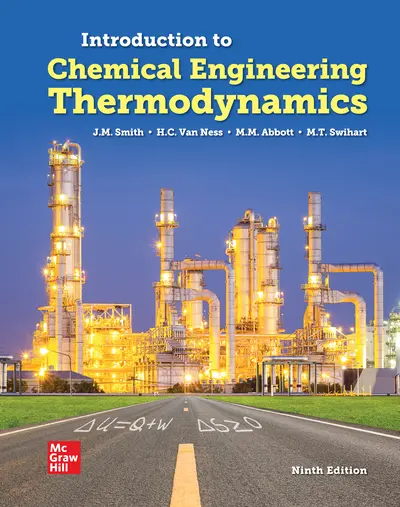My Account Details

ISBN10: 1260721477 | ISBN13: 9781260721478

* The estimated amount of time this product will be on the market is based on a number of factors, including faculty input to instructional design and the prior revision cycle and updates to academic research-which typically results in a revision cycle ranging from every two to four years for this product. Pricing subject to change at any time.
Instructor Information
Quick Actions (Only for Validated Instructor Accounts):
Introduction to Chemical Engineering Thermodynamics presents comprehensive coverage of thermodynamics from a chemical engineering viewpoint. The text provides a thorough exposition of the principles of thermodynamics and details their application to chemical processes. The chapters are written in a clear, logically organized manner, and contain an abundance of realistic problems, examples, and illustrations to help students understand complex concepts. This text is structured to alternate between the development of thermodynamic principles and the correlation and use of thermodynamic properties as well as between theory and applications.
To enhance student reading, the ninth edition now includes SmartBook® 2.0. SmartBook 2.0—Our adaptive reading experience has been made more personal, accessible, productive, and mobile.
3) Volumetric Properties of Pure Fluids
4) Heat Effects
5) The Second Law of Thermodynamics
6) Thermodynamic Properties of Fluids
7) Applications of Thermodynamics to Flow Processes
8) Production of Power from Heat
9) Refrigeration and Liquefaction
10) The Framework of Solution Thermodynamics
11) Mixing Processes
12) Phase Equilibrium: Introduction
13) Thermodynamic Formulations for Vapor/Liquid Equilibrium
14) Chemical-Reaction Equilibria
15) Topics in Phase Equilibria
16) Thermodynamic Analysis of Processes
Accessibility
Creating accessible products is a priority for McGraw Hill. We make accessibility and adhering to WCAG AA guidelines a part of our day-to-day development efforts and product roadmaps.
For more information, visit our accessibility page, or contact us at accessibility@mheducation.com
Need support? We're here to help - Get real-world support and resources every step of the way.